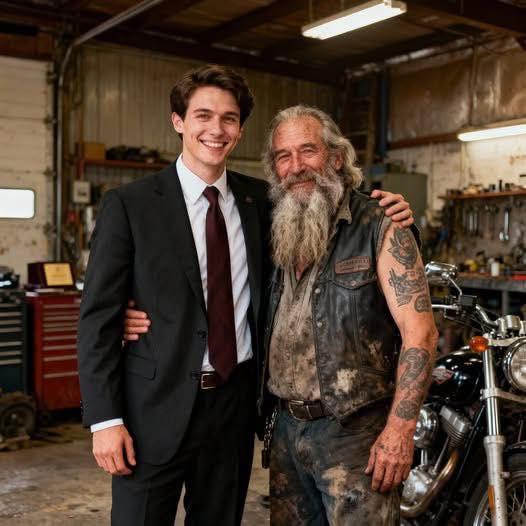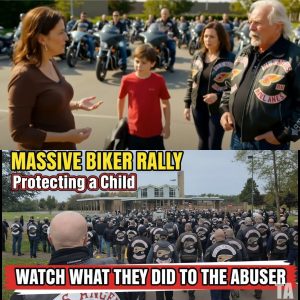The biker who raised me wasn’t my father; he was a dirty mechanic who found me sleeping in his shop’s dumpster when I was fourteen.
Big Mike, they called him, six-foot-four with a beard down to his chest and arms covered in military tattoos, who should have called the cops on the runaway kid stealing his thrown-out sandwich crusts.
Instead, he opened his shop door at 5 AM, saw me curled up between garbage bags, and said five words that saved my life: “You hungry, kid? Come inside.”
I’d run away from my fourth foster home, the one where the dad’s hands wandered and the mom pretended not to notice.
Sleeping behind Big Mike’s Custom Cycles seemed safer than another night in that house. I’d been living rough for three weeks, eating from dumpsters, avoiding cops who’d just throw me back into the system.
Mike didn’t ask questions that first morning. Just handed me a cup of coffee – my first ever – and a fresh sandwich from his own lunch.
“You know how to hold a wrench?” he asked.
I shook my head.
“Want to learn?”
That’s how it started. He never asked why I was in his dumpster. Never called social services.
Just gave me work to do, twenty bucks at the end of each day, and a cot in the shop’s back room when he “accidentally” left the door unlocked at night.
The other bikers started coming around, noticing the skinny kid organizing tools and sweeping floors.
They should have been scary – leather vests, skull patches, bikes that roared like thunder. Instead, they brought me food.
Snake taught me math using engine measurements. Preacher made me read to him while he worked, correcting my pronunciation.
Bear’s wife brought clothes her “son had outgrown” that somehow fit me perfectly.
Six months in, Mike finally asked, “You got somewhere else to be, kid?”
“No sir.”
“Then I guess you better keep that room clean. Health inspector doesn’t like mess.”
Just like that, I had a home. Not legally – Mike couldn’t adopt a runaway he was technically harboring. But in every way that mattered, he became my father.
He made rules. I had to go to school – he drove me there on his Harley every morning, ignoring the stares from other parents.
I had to work in the shop after school, learning a trade “because every man needs to know how to work with his hands.”
I had to attend Sunday dinners at the clubhouse, where thirty bikers would quiz me on homework and threaten to kick my ass if my grades slipped.
“You’re smart,” Mike told me one night, finding me reading one of his legal documents. “Scary smart. You could be something more than a grease monkey like me.”
“Nothing wrong with being like you,” I said.
He ruffled my hair. “Appreciate that, kid. But you got potential for something bigger. We’re gonna make sure you use it.”
The club paid for my SAT prep. When I got into college, they threw a party that shook the whole block.
Forty bikers cheering for a skinny kid who’d gotten a full scholarship. Mike cried that day, though he blamed it on engine fumes.
College was culture shock. Kids with trust funds and summer homes couldn’t understand the boy who got dropped off by a motorcycle gang.
I stopped mentioning Mike, stopped talking about home. When my roommate asked about my family, I said my parents were dead.
It was easier than explaining that my father figure was a biker who’d technically kidnapped me from a dumpster.
Law school was worse. Everyone networking, talking about connections, their lawyer parents.
When they asked about mine, I mumbled about blue-collar work. Mike came to my graduation, wearing his only suit – bought special for the occasion – with his motorcycle boots because dress shoes hurt his feet.
I was ashamed when my classmates stared. I introduced him as “a family friend” when my study group asked.
He never said anything about it. Just hugged me, told me he was proud, and rode eight hours home alone.
I got a job at a top firm. Stopped visiting the shop as much. Stopped answering calls from the club. I was building a respectable life, I told myself. The kind of life that would never land me in a dumpster.
Then, three months ago, Mike called.
“Not asking for me,” he said, which is how he always started when asking for help.
“But the city’s trying to shut us down. Saying we’re a ‘blight’ on the community. Bringing down property values. They want to force me to sell to some developer.”
Forty years, Mike had run that shop. Forty years of fixing bikes for people who couldn’t afford dealer prices.
Forty years of quietly helping runaways like me, though I learned later I wasn’t the first or the last kid to find safety in his back room.
“Get a lawyer,” I said.
“Can’t afford one good enough to fight city hall.”
I should have offered immediately. Should have driven down that night. Instead, I said…….

Instead, I said, “I’ll look into it,” the way I’d tell a client whose case wasn’t worth the billable hours.
Mike didn’t push. He never did. “Do what you can, kid,” he said, and hung up.
I didn’t call back. Work was crushing me, partners breathing down my neck, bonuses dangling like bait. I told myself I’d deal with it later. Weeks passed.
Then the letter came. Not from Mike—from Bear. Scrawled in barely legible handwriting:
Mike’s gone.
Heart attack in the shop. They found him slumped over an engine he’d been fixing for free. The city seized the property the same week.
I sat in my corner office, letter trembling in my hand, and for the first time in years I couldn’t breathe.
I’d missed the last ride. The last chance to show up for the man who had shown up for me every single day when no one else would.
The funeral was at the clubhouse. Leather vests, steel horses lined up for miles, men I hadn’t seen in years crying openly. They handed me a wrench instead of a flower, and we laid it on his casket. Tradition, Bear said. Mike always said a wrench in the right hands could fix anything.
When it was my turn to speak, I froze. All the words I’d rehearsed in polished courtrooms vanished. Finally I managed:
“I wouldn’t be standing here in this suit, with these degrees, if a dirty mechanic hadn’t pulled me out of a dumpster. I was ashamed of him, once. But the truth is… he’s the only father I ever had. And I let him down when he needed me most.”
The room was silent, except for muffled sobs and the soft rumble of idling bikes outside.
Snake stood up, old and gray now, and put a hand on my shoulder. “You still got family, kid. You don’t walk away this time.”
That night, I signed the paperwork to fight the city’s seizure. Not for a client, not for a paycheck. For Mike. For the man who taught me what family means.
And maybe, in some way, to forgive myself.





